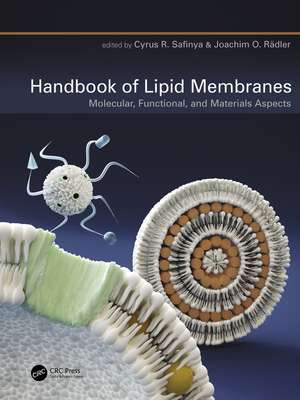Handbook of Lipid Membranes: Molecular, Functional, and Materials Aspects
Editat de Cyrus R. Safinya, Joachim O. Rädleren Limba Engleză Paperback – 4 oct 2024
Key Features:
- Includes experimental and theoretical overviews on the role of lipids, with or without associated biomolecules, as structural components imparting distinct membrane shapes and intermembrane interactions
- Covers the mechanisms of lipid-membrane curvature, by peptide and protein binding, and the roles of signalling lipids and the cytoskeleton in plasma membrane shape evolution
- Covers advanced X-ray and force measurement techniques
- Discusses applications in biomedicine, cosmetics, and nanotechnology, including lipid vectors in nucleic acid, drug delivery in dermal applications, and lipid-based sensors and artificial biointerfaces
- Covers artificial membranes from block copolymers, synthetic copolypeptides, and recombinant proteins
- Includes an exciting section that explores the role of lipids in the origin of life in hydrothermal conditions
| Toate formatele și edițiile | Preț | Express |
|---|---|---|
| Paperback (1) | 317.47 lei 6-8 săpt. | |
| CRC Press – 4 oct 2024 | 317.47 lei 6-8 săpt. | |
| Hardback (1) | 882.88 lei 6-8 săpt. | |
| CRC Press – 15 sep 2021 | 882.88 lei 6-8 săpt. |
Preț: 317.47 lei
Preț vechi: 359.18 lei
-12% Nou
Puncte Express: 476
Preț estimativ în valută:
60.75€ • 64.96$ • 50.65£
60.75€ • 64.96$ • 50.65£
Carte tipărită la comandă
Livrare economică 18 aprilie-02 mai
Preluare comenzi: 021 569.72.76
Specificații
ISBN-13: 9781032014418
ISBN-10: 1032014415
Pagini: 376
Ilustrații: 322
Dimensiuni: 210 x 280 mm
Greutate: 0.69 kg
Ediția:1
Editura: CRC Press
Colecția CRC Press
Locul publicării:Boca Raton, United States
ISBN-10: 1032014415
Pagini: 376
Ilustrații: 322
Dimensiuni: 210 x 280 mm
Greutate: 0.69 kg
Ediția:1
Editura: CRC Press
Colecția CRC Press
Locul publicării:Boca Raton, United States
Public țintă
AcademicNotă biografică
Cyrus R. Safinya is professor of physics at the University of California, Santa Barbara, USA.
Joachim O. Rädler is professor of experimental physics at Ludwig-Maximilians-Universität München, Germany.
Joachim O. Rädler is professor of experimental physics at Ludwig-Maximilians-Universität München, Germany.
Cuprins
Preface. Editors. Contributors. Chapter 1 A Short History of Membrane Physics. Chapter 2 Structures and Interactions in Freely Suspended Multilayer Membranes and Dilute Lamellar Fluid Membranes from Synchrotron X-Ray Scattering. Chapter 3 Structures of Lipid Membranes: Cubic and Inverse Hexagonal Phases. Chapter 4 Structure of Lipid Membranes by Advanced X-Ray Scattering and Imaging. Chapter 5 Adhesion Protein Architecture and Intermembrane Potentials: Force Measurements and Biological Significance. Chapter 6 Charged Membranes: Poisson・Boltzmann Theory, the DLVO Paradigm, and Beyond. Chapter 7 Membrane Shape Evolution In Vitro. Chapter 8 Mechanisms of Membrane Curvature Generation by Peptides and Proteins: A Unified Perspective on Antimicrobial Peptides. Chapter 9 Lipid Membrane Shape Evolution and the Actin Cytoskeleton. Chapter 10 Effects of Osmotic Stress on Topologically Closed Membrane Compartments. Chapter 11 Cationic Liposomes as Spatial Organizers of Nucleic Acids in One, Two, and Three Dimensions: Liquid Crystal Phases with Applications in Delivery and Bionanotechnology. Chapter 12 Lipids in DNA, RNA, and Peptide Delivery for In Vivo Therapeutic Applications. Chapter 13 Electrostatics of Lipid Membranes Interacting with Oppositely Charged Macromolecules. Chapter 14 Lipid-Based Bioanalytical Sensors. Chapter 15 Lipids in Dermal Applications: Cosmetics and Pharmaceutics. Chapter 16 Supported Lipid Bilayers. Chapter 17 Artificial Membranes Composed of Synthetic Copolypeptides. Chapter 18 Synthetic Membranes from Block Copolymers, Recombinant Proteins, and Dendrimers. Chapter 19 Amphiphilic Self-Assembly and the Origin of Life in Hydrothermal Conditions. Index.
Descriere
This Handbook provides a comprehensive overview of lipid membrane fundamentals and applications. It gives the fundamental physical and biochemical aspects of membrane-related processes in living cells, and then relates them to how scientists are building bioinspired, artifical membrane-based systems.
